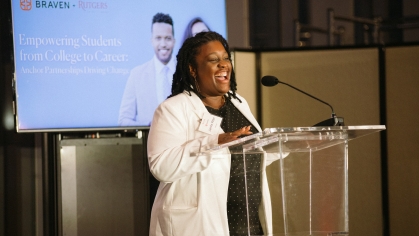Q&A: What Led to a Rebranding of the Office of Diversity
Charles A. Brown began leading Rutgers Business School’s Office of Diversity Programs nearly a decade ago, overseeing programs to attract historically underrepresented students to business fields and to prepare them to take on leadership positions in the corporate world.
It wasn’t enough for Brown to take high-performing diverse students and send them onto paths promising success. He wanted to do more.
The effort to expand programming and emphasize inclusion as well as diversity led to a rebranding. Today, the Office of Inclusion, Diversity, Equity and Access is turning out new programs and attracting new partners.
“As a teenage student attending Arts High School in Newark, I was unaware of many opportunities that existed,” Brown said recently. “I just needed someone or something to help turn that light switch on for me and help me to catch fire, and that’s what our programs are doing for Rutgers Business School students. We are that spark, and they’re catching fire.”
In an interview, Brown talked about what led to the rebranding, the importance of bringing faculty into his office’s efforts and how he measures the impact.
Explain the reason for changing the name of the Office of Diversity.
For the greater part of 10 years, we’ve been supporting our underrepresented students via what we were calling the Office of Diversity programs. But I believe how and why we support students has evolved in that time frame. It’s about more than just diversity programs, it’s more than just numbers, it’s more than just demographics. It’s about more than inclusion. Yes, we are in a higher education space, but I believe that this four-ingredient recipe – inclusion, diversity, equity, and access – makes for success in any environment. We realized that each component is integral to our success at Rutgers Business School. We’re not stewarding our diversity if there’s no inclusion, and we can’t have equity if there’s no access. We need all four ingredients interacting together. If not, even our best intentions place us at a disadvantage.
What is the significance of the order of words in the new name?
This is much more than re-imagining how we approach diversity. We renamed and rebranded the office in a way that will institutionalize these four strategic areas in all our programs, initiatives and services for the long term. It’s really about the future and facilitating the transformation of both the classroom and the boardroom into spaces that exemplify our growing diverse societies. The work that we’re doing right now will help to ensure opportunities for all. We’re moving toward diversity whether we like it or not and whether we are prepared or not. Having the words in that order, starting with inclusion, embracing our diversity, and ensuring equity and access for all, this is our “big IDEA."
"We realized that each component is integral to our success at Rutgers Business School. We’re not stewarding our diversity if there’s no inclusion, and we can’t have equity if there’s no access. We need all four ingredients interacting together."
What are some of the ways you’ll broaden access to the resources and support that your office has offered to historically underrepresented students?
I’m incredibly proud of the work that we’ve accomplished with the RBS B-STAR program over the last decade. I’ve witnessed the lives of hundreds of students and their families be transformed after the investment we’ve made via our programs and initiatives. But while proud, I’ve always been troubled by the reality that our RBS B-STAR program can support only a fraction of our students from historically underrepresented and historically underserved backgrounds due to the program’s budget. How do we support the remaining population of underrepresented students who might not have access to the B-STAR program? The burden of this question provided the spark needed to reimagine the office and how we expand the scope of our work. This renaming presents an excellent opportunity to broaden our outreach to students, faculty, and staff from underrepresented backgrounds and widens the scope of our services and support across Newark and New Brunswick. In addition to undergraduate students, this support now includes our transfer student population as well as our graduate student population.
What’s making that possible now?
We now have buy-in not only from students and their families but now faculty, staff at the university, corporate partners and community-based organizations, and I can’t forget our K-12 partners across the state. It’s become much more of a collaborative effort as we evolve, and I think a huge part of this big IDEA includes community engagement.
Can you talk about the bigger role professors and instructors will play in helping the RBS IDEA Office with its goal.
Our faculty are key stakeholders in the success of our programs and initiatives. We saw that this summer with the launch of our DiversityLaunch Institute. The diversity that students will experience as they enter the global workplace should be first experienced in their local communities but certainly in their classrooms and with their professors. That was demonstrated this summer when faculty (and staff) galvanized and assisted with 25 different workshops for first year and transfer students making the transition into RBS. The work of the IDEA office doesn’t begin to make it off the ground without the support of the IDEA champions from each academic department.
"I’ve witnessed the lives of hundreds of students and their families be transformed after the investment we’ve made via our programs and initiatives...How do we support the remaining population of underrepresented students who might not have access to the B-STAR program? The burden of this question provided the spark needed to reimagine the office and how we expand the scope of our work."
How does an institution like Rutgers Business School measure how it’s doing on the issue of inclusion and equity and access?
It begins and ends with the student experience and student outcomes. As an advocate, my focus is on keeping the main thing, the main thing in all that we’re doing. In terms of how we measure our impact: Are students feeling a sense of belonging because of our programs and initiatives? Are students succeeding in the classroom because of the networks they’re plugged into after participating in our programs and initiatives. Are students earning internships opportunities and are students securing full-time employment opportunities post-graduation as a result of the support of our programs and initiative? There are other valuable anecdotal metrics that are considered as well and it’s a combination of all these measures that help to define our impact. I’m happy to say we have a strong track record. We’re in the high 90 percentile range of students who have participated in our RBS IDEA programs and initiatives and have gone on to secure career opportunities post-graduation.
Additionally, we encourage networking and the pursuit of internship opportunities very early in a students’ academic journey at RBS. As a result, we also have a high percentage of first-year students in the RBS B-STAR program who are securing internship opportunities. Many companies are usually looking for sophomores and juniors when filling internships but after connecting and engaging with our first-year RBS B-STAR students, many of these same companies decide to provide opportunities to students. These internships are some of the major benefits to access, very early access to professional environments and professional development. These experiences help to build confidence, strengthen a student’s resume and as a result, prepares and catapults them into other opportunities.


